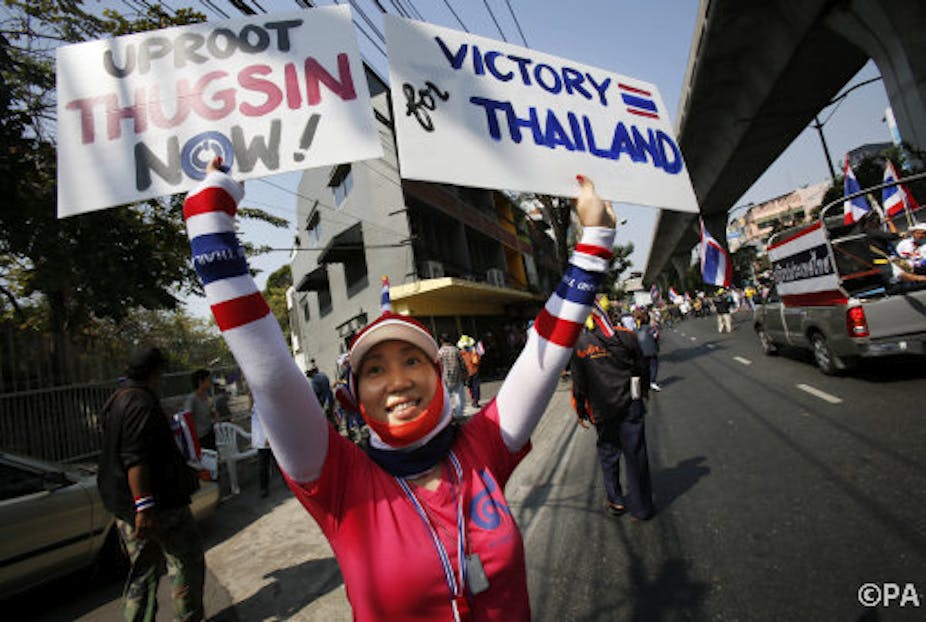After street clashes between groups of armed protesters on Saturday, many feared that Sunday’s election in Thailand would see an upsurge in violence. Anti-government protesters who opposed the vote had threatened to prevent people from entering polling stations, and in many areas of Bangkok authorities had shut them down to prevent clashes.
Yet across the country’s north and north-east, where the government receives most of its support, voting went on unimpeded – and just as they have done repeatedly since 2000, early results suggest these areas turned out with overwhelming support for a pro-Thaksin administration.
The cancelled polling means that the election itself is far from over, but neither is the political crisis that is increasingly making Thailand ungovernable. Thai society remains divided, and it is clear that the anger, animosity and antipathy felt between opposing social groups is deepening. At the same time, the political forces at play have become increasingly unwilling to engage in constructive dialogue or any genuine attempt to find a peaceful way out.
Reform before elections
The core reason why Sunday’s election could only ever be symbolic was the decision by the opposition, the Democrat Party, to boycott the poll, their stated intention being to push for reform before any election took place. It was a bold move that bolstered the numbers of the anti-government protest movement, named the PDRC (the People’s Democratic Reform Committee), as well as emphasising its core reformist message.
But by failing to distance itself from the aim of “uprooting the Thaksin regime”, as laid out by ex-Democrat leader of the protests Suthep Thaugsuban, the party ultimately let down the sizable minority of Thai society from which it receives its support. They not only denied traditional Democrat voters an electoral chance to express their frustrations with the Yingluck government; they also forced many of their supporters to adopt the same zero-sum stance that is pushing the country down a path from which there can be no easy return.
Few doubt the need to reform Thai politics. But for reform to succeed, both sides must to be convinced they will not be side-lined from the process. Talk of a “people’s council” made up of unelected “good people” has rattled not only government supporters, but many others who distrust Thailand’s entrenched elite. As judicial forces continue to threaten the prime minister, Yingluck Shinawatra, and her party, many are fearful that a power vacuum is being created in order to hijack the political process altogether. That is something they are not willing to accept.
For supporters of the current government, the prospect is even more terrifying. In a society where political TV stations broadcast widely, and where 25 million people are on Facebook, few have missed some of the most worrying rhetoric coming from the PDRC stage. References to a different kind of democracy have regularly been made, speculating that an “educated” Bangkok vote could be worth more than an “uneducated” one from a north-eastern village. Whilst probably not representative of all those who attend the rallies, indications of what the reform might look like fly wildly around social media and only serve to polarise society along ever sharper lines.
Bridging the divide
If the PDRC is victorious, then Sunday’s election might be Thailand’s last for some time. But the fact that it happened at all proves that whatever is being planned in air-conditioned rooms in Bangkok, most Thais are far from ready to accept a re-negotiation of their electoral rights. The only way to bridge the political divide now is for those calling for zero-sum solutions to pull back and recognise those rights as non-negotiable.
It is clear now that any attempt to “uproot the Thaksin regime” (Yingluck Shinawatra is the younger sister of exiled former prime minister Thaksin Shinawatra who was ousted in a military coup in 2006) would put those who oppose the government into direct confrontation with the majority of the Thai population. It is for that reason that many observers are starting to refer to Thailand’s political crisis as a civil war. The country is not there yet, but should Yingluck be deposed in a judicial or military coup, many fear Thailand could slip into a spiral of violence. Even then, this disaster could be averted if Thaksin was invited back quickly, directly and openly to participate in negotiations that sought a real compromise.
But without a figure to provide clear-headed and honest mediation, and who could be trusted by all sides, that is unlikely to happen. Over the past few years the monarchy, once seen as the cultural glue that kept Thailand’s political system together, has become politicised by a lèse majesté law that restricts people from talking openly about the institution. It has also been damaged by association, as anti-government protesters regularly adopt the image of the king to fight for their openly political demands. But most importantly, with the king himself in ailing health, few Thais expect he will be willing or able to play a major role in ending the conflict.
Ultimately, the only solution to Thailand’s ongoing political crisis is for those currently entrenched in their views to face some hard truths. There is no longer room for nostalgia, no salvation in an imagined social contract in which harmony prevails. What is needed is an urgent reality check about where the country is heading. Without that, the next few weeks and months will be dark indeed for what was one once one of Asia’s most stable societies.

